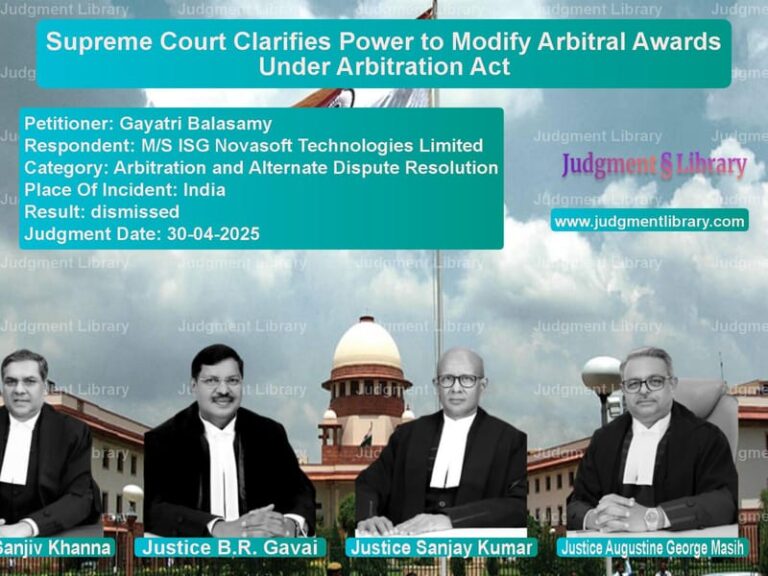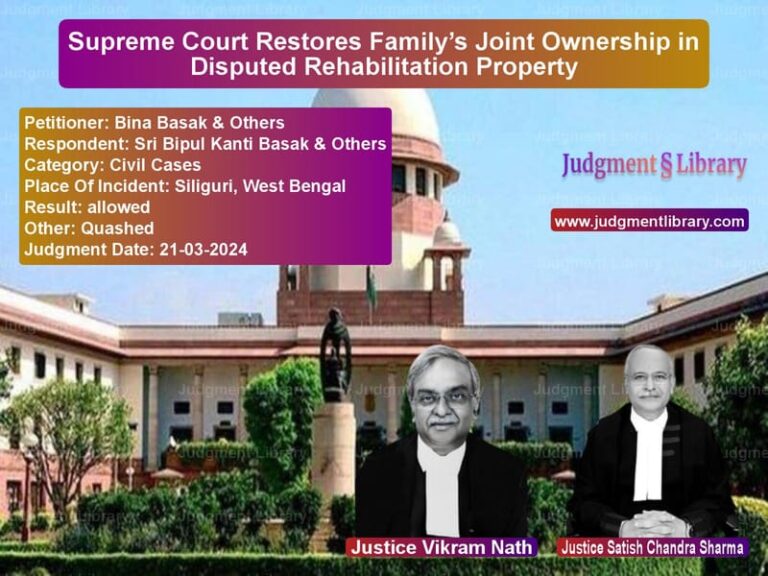Supreme Court Upholds Enforcement of Foreign Arbitral Award Against Avitel Post Studioz
The Supreme Court of India recently upheld the enforcement of a foreign arbitral award against Avitel Post Studioz Limited and its directors, rejecting their claims of bias and public policy violations. The case, Avitel Post Studioz Limited & Others vs. HSBC PI Holdings (Mauritius) Limited, marks an important precedent in international arbitration and the recognition of foreign awards in India.
The Court reaffirmed that arbitral bias claims must meet a high standard and that Indian courts should adopt an internationally recognized, narrow definition of public policy when reviewing foreign arbitral awards. The ruling is a significant victory for the enforcement of international arbitration awards under Indian law.
Background of the Case
The dispute arose from an investment made by HSBC PI Holdings (Mauritius) Limited (formerly HPEIF Holdings 1 Limited), in Avitel Post Studioz Limited. HSBC invested USD 60 million in Avitel’s equity based on representations that the funds were required to service a major contract with the British Broadcasting Corporation (BBC). However, HSBC later discovered that the BBC contract did not exist, and the invested funds had allegedly been siphoned off to other companies.
Arbitration Proceedings
After discovering the fraud, HSBC invoked the arbitration clause in its Share Subscription Agreement (SSA) and Shareholders’ Agreement (SHA), which provided for arbitration under the Singapore International Arbitration Centre (SIAC). The tribunal, consisting of three arbitrators including Mr. Christopher Lau SC, awarded HSBC USD 60 million in damages for fraudulent misrepresentation on September 27, 2014.
Legal Proceedings in India
Enforcement Proceedings Before the Bombay High Court
- HSBC sought enforcement of the SIAC award in India under Section 48 of the Arbitration and Conciliation Act, 1996.
- Avitel opposed the enforcement, arguing that the award was against public policy due to an alleged bias of the presiding arbitrator, Mr. Christopher Lau SC.
- The Bombay High Court rejected Avitel’s objections and ruled in favor of HSBC, holding that there was no evidence of bias and that the award was enforceable in India.
Supreme Court Proceedings
Avitel appealed to the Supreme Court, raising the following key arguments:
Arguments by Avitel
- The presiding arbitrator, Mr. Christopher Lau SC, had a conflict of interest due to his role as an independent director of Wing Tai Holdings, a company allegedly linked to HSBC.
- The arbitrator’s failure to disclose this alleged conflict violated the IBA Guidelines on Conflict of Interest in International Arbitration.
- Enforcement should be refused under Section 48(2)(b) of the Indian Arbitration Act on the grounds that the award violated Indian public policy.
Arguments by HSBC
- There was no material conflict of interest, as Wing Tai Holdings was not affiliated with HSBC.
- The arbitrator’s independence and impartiality were never questioned during the arbitration.
- Avitel had ample opportunity to raise bias objections during the arbitration but failed to do so.
- The standard for refusing enforcement under Section 48 is extremely high and was not met in this case.
Supreme Court’s Key Observations
1. High Threshold for Bias in Arbitration
The Court ruled that bias allegations must meet an exceptionally high standard to justify non-enforcement of a foreign arbitral award. It emphasized that courts should follow internationally accepted principles of impartiality and independence.
“The test is whether the alleged bias violates the ‘most basic notions of morality or justice’—a high bar that Avitel failed to meet.”
2. Application of International Standards
The Court highlighted that India is a signatory to the New York Convention on the Recognition and Enforcement of Foreign Arbitral Awards. As such, courts should adopt an internationalist approach and avoid relying on domestic notions of public policy to refuse enforcement.
3. No Evidence of Arbitrator Bias
The Court found no direct connection between HSBC and Wing Tai Holdings and noted that Mr. Lau’s role as an independent director did not create a conflict requiring disclosure.
4. Delay and Strategic Litigation by Avitel
The Court observed that Avitel had delayed enforcement proceedings for over a decade through frivolous litigation tactics, including contempt of court. It criticized the company’s strategy of raising bias objections only at the enforcement stage, rather than during the arbitration.
5. Pro-Enforcement Bias in Indian Arbitration Law
The Court reaffirmed India’s commitment to minimal judicial intervention in the enforcement of foreign awards and emphasized that challenges based on public policy should be narrowly interpreted.
Final Verdict
The Supreme Court dismissed Avitel’s appeal and upheld the enforcement of the SIAC award. It directed that enforcement proceedings should proceed without further delay.
“Refusal of enforcement of foreign awards should be rare, and objections should be based on clear violations of morality and justice, not on speculative allegations.”
Conclusion
The Supreme Court’s ruling in Avitel vs. HSBC strengthens India’s reputation as an arbitration-friendly jurisdiction and reinforces the principle of finality in international arbitration. The decision ensures that losing parties cannot use frivolous challenges to delay enforcement, providing greater confidence to foreign investors and businesses relying on arbitration in India.
The ruling serves as a landmark precedent on key arbitration issues, including:
- The high standard for proving arbitral bias.
- The narrow interpretation of public policy under Section 48.
- The importance of raising objections during arbitration, rather than at the enforcement stage.
- India’s pro-enforcement stance in line with the New York Convention.
With this judgment, the Supreme Court has sent a strong message that India will uphold foreign arbitral awards and discourage strategic litigation aimed at frustrating enforcement.
Petitioner Name: Avitel Post Studioz Limited & Others.Respondent Name: HSBC PI Holdings (Mauritius) Limited.Judgment By: Justice Hrishikesh Roy, Justice Prashant Kumar Mishra.Place Of Incident: Singapore (SIAC Arbitration).Judgment Date: 04-03-2024.
Don’t miss out on the full details! Download the complete judgment in PDF format below and gain valuable insights instantly!
Download Judgment: avitel-post-studioz-vs-hsbc-pi-holdings-(ma-supreme-court-of-india-judgment-dated-04-03-2024.pdf
Directly Download Judgment: Directly download this Judgment
See all petitions in Arbitration Awards
See all petitions in Enforcement of Awards
See all petitions in International Arbitration
See all petitions in Judgment by Hrishikesh Roy
See all petitions in Judgment by Prashant Kumar Mishra
See all petitions in dismissed
See all petitions in supreme court of India judgments March 2024
See all petitions in 2024 judgments
See all posts in Arbitration and Alternate Dispute Resolution Category
See all allowed petitions in Arbitration and Alternate Dispute Resolution Category
See all Dismissed petitions in Arbitration and Alternate Dispute Resolution Category
See all partially allowed petitions in Arbitration and Alternate Dispute Resolution Category







